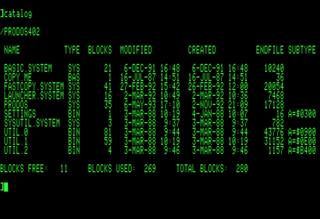The bit is the most basic unit of information in computing and digital communications. The name is a portmanteau of binary digit. The bit represents a logical state with one of two possible values. These values are most commonly represented as either "1" or "0", but other representations such as true/false, yes/no, on/off, or +/− are also widely used.
The byte is a unit of digital information that most commonly consists of eight bits. Historically, the byte was the number of bits used to encode a single character of text in a computer and for this reason it is the smallest addressable unit of memory in many computer architectures. To disambiguate arbitrarily sized bytes from the common 8-bit definition, network protocol documents such as the Internet Protocol refer to an 8-bit byte as an octet. Those bits in an octet are usually counted with numbering from 0 to 7 or 7 to 0 depending on the bit endianness.
A binary prefix is a unit prefix that indicates a multiple of a unit of measurement by an integer power of two. The most commonly used binary prefixes are kibi (symbol Ki, meaning 210 = 1024), mebi (Mi, 220 = 1048576), and gibi (Gi, 230 = 1073741824). They are most often used in information technology as multipliers of bit and byte, when expressing the capacity of storage devices or the size of computer files.
The kilobyte is a multiple of the unit byte for digital information. The International System of Units (SI) defines the prefix kilo as a multiplication factor of 1000 (103); therefore, one kilobyte is 1000 bytes. The internationally recommended unit symbol for the kilobyte is kB.
KB, kB or kb may stand for:
The kilobit is a multiple of the unit bit for digital information or computer storage. The prefix kilo- (symbol k) is defined in the International System of Units (SI) as a multiplier of 103 (1 thousand), and therefore,

ProDOS is the name of two similar operating systems for the Apple II series of personal computers. The original ProDOS, renamed ProDOS 8 in version 1.2, is the last official operating system usable by all 8-bit Apple II series computers, and was distributed from 1983 to 1993. The other, ProDOS 16, was a stop-gap solution for the 16-bit Apple IIGS that was replaced by GS/OS within two years.
The megabit is a multiple of the unit bit for digital information. The prefix mega (symbol M) is defined in the International System of Units (SI) as a multiplier of 106 (1 million), and therefore
Throughput of a network can be measured using various tools available on different platforms. This page explains the theory behind what these tools set out to measure and the issues regarding these measurements.
File size is a measure of how much data a computer file contains or, alternately, how much storage it consumes. Typically, file size is expressed in units of measurement based on the byte. By convention, file size units use either a metric prefix or a binary prefix.
K is the eleventh letter of the Latin alphabet.
In telecommunications, data-transfer rate is the average number of bits (bitrate), characters or symbols (baudrate), or data blocks per unit time passing through a communication link in a data-transmission system. Common data rate units are multiples of bits per second (bit/s) and bytes per second (B/s). For example, the data rates of modern residential high-speed Internet connections are commonly expressed in megabits per second (Mbit/s).
This timeline of binary prefixes lists events in the history of the evolution, development, and use of units of measure which are germane to the definition of the binary prefixes by the International Electrotechnical Commission (IEC) in 1998, used primarily with units of information such as the bit and the byte.
In digital computing and telecommunications, a unit of information is the capacity of some standard data storage system or communication channel, used to measure the capacities of other systems and channels. In information theory, units of information are also used to measure information contained in messages and the entropy of random variables.
A master boot record (MBR) is a special type of boot sector at the very beginning of partitioned computer mass storage devices like fixed disks or removable drives intended for use with IBM PC-compatible systems and beyond. The concept of MBRs was publicly introduced in 1983 with PC DOS 2.0.
gigabyte (GB) is 10003 bytes.
Megabyte (MB) is a decimallized unit of data storage measurement equalling 106 bytes.
This page is based on this
Wikipedia article Text is available under the
CC BY-SA 4.0 license; additional terms may apply.
Images, videos and audio are available under their respective licenses.
